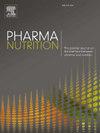Omega-3 supplementation in migraine prophylaxis: An updated systematic review and meta-analysis
IF 2.4
Q3 NUTRITION & DIETETICS
引用次数: 0
Abstract
Objective
To assess the efficacy of omega-3 fatty acids in migraine prophylaxis by examining their impact on migraine frequency, severity, duration, and quality of life, measured using the headache impact test-6 (HIT-6) score.
Methods
A comprehensive search was conducted across PubMed, Scopus, Web of Science, and Cochrane CENTRAL until June 2024. Clinical trials evaluating the effect of omega-3 in migraine prevention were included. The risk of bias was assessed using RoB-1 for RCTs and ROBINS-1 for non-RCTs. Meta-analysis was performed using RevMan software, with heterogeneity assessed using chi-square and I² statistics. Subgroup analyses and leave-one-out analyses were conducted.
Results
Fourteen clinical trials involving 1944 patients were included, with nine studies in the meta-analysis. The overall results of omega-3 supplementation revealed a significant reduction in the migraine frequency (MD: -1.74 days per month, 95% CI: [-3.45, -0.03], P = 0.05) and severity of migraine attacks (SMD: -0.28, 95% CI: [-0.54, -0.02], P = 0.04 when compared to various comparators (placebo, sodium valproate, diet low in omega-6 fatty acids, and average US omega-3 and omega-6 intake). However, its effect on HIT-6 was not significant (MD: -8.9, 95 % CI: [-20.47, 2.67], P = 0.13), and its impact on migraine duration was also not significant (MD: -1.94 hours per episode, 95 % CI: [-4.24, 0.37], P = 0.1).
Conclusions
Omega-3 fatty acids effectively reduced the frequency and severity of migraine attacks but did not significantly reduce migraine duration and HIT-6. Further research is needed to explore the long-term effects and optimize dosing for migraine prevention.
补充Omega-3预防偏头痛:一项最新的系统综述和荟萃分析
目的通过头痛影响测试-6 (HIT-6)评分评估omega-3脂肪酸对偏头痛频率、严重程度、持续时间和生活质量的影响,以评估其在偏头痛预防中的功效。方法综合检索PubMed、Scopus、Web of Science和Cochrane CENTRAL,检索截止至2024年6月。评估omega-3在偏头痛预防中的作用的临床试验被纳入其中。随机对照试验采用ROBINS-1,非随机对照试验采用ROBINS-1评估偏倚风险。采用RevMan软件进行meta分析,采用卡方统计和I²统计评估异质性。进行亚组分析和留一分析。结果纳入14项临床试验,涉及1944例患者,其中9项研究纳入meta分析。总体结果显示,与各种比较(安慰剂、丙戊酸钠、低omega-6脂肪酸饮食和美国平均omega-3和omega-6摄入量)相比,omega-3补充剂显著降低了偏头痛的频率(MD:每月-1.74天,95% CI: [-3.45, -0.03], P = 0.05)和偏头痛发作的严重程度(SMD: -0.28, 95% CI: [-0.54, -0.02], P = 0.04)。然而,其对HIT-6的影响并不显著(MD: -8.9, 95 % CI: [-20.47, 2.67], P = 0.13),其对偏头痛持续时间的影响也不显著(MD: -1.94 小时/发作,95 % CI: [-4.24, 0.37], P = 0.1)。结论somega -3脂肪酸可有效降低偏头痛发作频率和严重程度,但对偏头痛病程和HIT-6无显著影响。需要进一步的研究来探索偏头痛预防的长期效果和优化剂量。
本文章由计算机程序翻译,如有差异,请以英文原文为准。
求助全文
约1分钟内获得全文
求助全文
来源期刊

PharmaNutrition
Agricultural and Biological Sciences-Food Science
CiteScore
5.70
自引率
3.10%
发文量
33
审稿时长
12 days
 求助内容:
求助内容: 应助结果提醒方式:
应助结果提醒方式:


